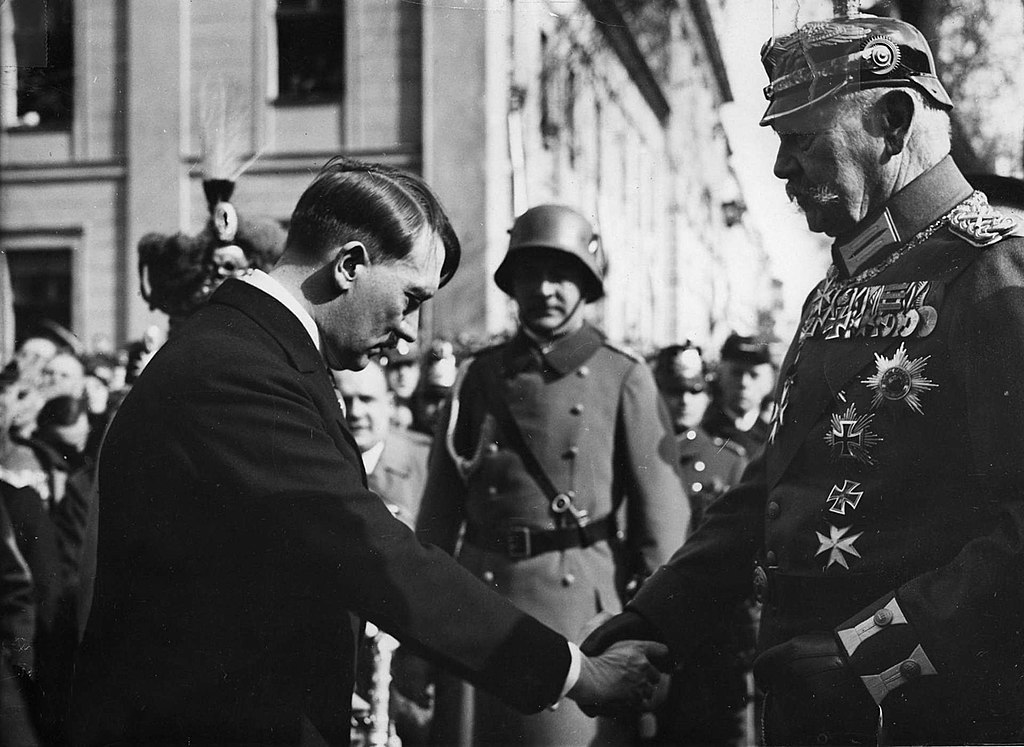On ‘Holocaust Memorial Day’ Europe’s leaders set aside their differences to kneel at the altar of their continent’s new religion: from Vladimir Putin in Moscow to Pedro Sánchez in Madrid, they acknowledged that the ‘Holocaust’ was the greatest crime in history.
Three days after this memorial day there is another anniversary, less widely noted by mainstream politicians and media. Ninety years ago today – on 30th January 1933 – Adolf Hitler was appointed Chancellor of Germany by his country’s veteran President, the First World War commander Gen. Paul von Hindenburg.
At the start of that month Hitler had told the German people in his New Year message that 1933 would see the end of an “uprooted liberal age”. He added:
“The state of inner decay which, in 1918, was looked upon merely as a phenomenon of crisis, has now become chronic. If Germany is to be put on her feet again, it can only be by a movement as intolerant and as ready to take prompt action as its opponents are. Where other movements have failed, only the National Socialists can win victory.”

By the end of the month the National Socialist leader was able to begin demonstrating that unlike most politicians, he intended to keep his promises.
One of Britain’s leading newspapers, the Daily Mail, reported on the morning after Hitler’s victory: “At the age of 43 he assumes the mantle of Bismarck, and may well look forward to a long career as a statesman. He has won through to the Chancellorship against heavy odds. …He had no wealth or special training to serve him …Good looks and a charming personality have helped him on his way, but most of all he owes his success to his intensity of purpose and his ability to inspire the masses with his burning oratory.”
An editorial in The Times – which was then still seen as the world’s most influential newspaper – acknowledged: “That Herr Hitler, who leads the strongest party in the Reichstag… should be given the chance of showing that he is something more than an orator and an agitator was always desirable.”
Within a month of Adolf Hitler taking office, a communist sympathiser set fire to Germany’s parliament, the Reichstag. Though it seems likely that the saboteur was acting prematurely rather than on direct orders, consequent raids on Communist party headquarters in Berlin discovered detailed plans for violent revolution.

The Berlin authorities approached their counterparts in London offering cooperation against the Communists, and MI5 officer Guy Liddell visited Berlin to inspect some of the documents captured from Communist HQ, which included many showing Moscow funding for anti-British subversion in India.
Adolf Hitler was a great admirer of the British Empire, and wished to demonstrate to its rulers that Stalin’s Russia and its international instrument the Comintern were the common enemy of Britons and Germans alike.
On his return to London, Guy Liddell’s report to his MI5 bosses admitted that there was considerable truth in National Socialist allegations about Jewish behaviour during the previous fourteen years of ‘democracy’ under the Weimar Republic:
“There have undoubtedly been some very serious cases of corruption in Government institutions where the Jews had a firm foothold. For the last ten years it has been extremely noticeable that access to the chief of any department was only possible through the intermediary of a Jew. It was the Jew who did most of the talking and in whose hands the working out of any scheme was ultimately left.”
He concluded that “the Berlin Police who have had ample opportunity for studying the working of the Communist International at close quarters, are in possession of extremely valuable records, which if placed virtually at our disposal will be of great assistance in establishing how the Comintern’s work in Western Europe and in the Colonies is being reorganised.
“There is no doubt that the moment chosen to establish contact with the present regime has been a good one. Those in authority are persuaded that they have saved Europe from the menace of Communism. They are proud of what they have done, and anxious to convince the outside world that their action was fully justified. It was for this reason that they were so communicative on matters about which in normal times they would have preferred to remain silent.
“In their present mood, the German Police are extremely ready to help us in any way they can.”

For much of the next six years it seemed possible that this cooperative relationship could continue. Its collapse into the maelstrom of a second catastrophic European civil war, setting Briton against German, was a disaster from which our continent is only now beginning to recover.
The post-1945 order is now collapsing. We must hope that the edifice of historical lies will also soon collapse, despite desperate attempts to bolster it by means of “democratic memory laws”, unconstitutional deportations and extraditions, and the jailing of dissident scholars and publishers.
Whether Christians or not, we can as Europeans appreciate the words of St John: “Ye shall know the truth, and the truth shall make you free.”



